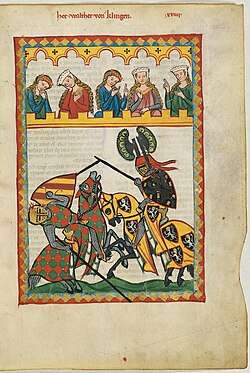Walther von Klingen(died 1 March 1284) was a nobleman from theThurgauarea who donated to and founded monasteries, and later became a close associate and supporter of King of GermanyRudolf von Habsburg.Some of his poetry, which belongs to theMiddle High GermanMinnesangtradition, has been preserved in theCodex Manessemanuscript.

Life
editWalther came from an oldThurgaufamily.[1]He was the son of Ulrich II von Altenklingen, the founder ofKlingnau.[2]His mother was Ita von Tägerfelden.[3]The first document mentioning Walther (together with his parents and older brother) is from 1240.[4]In 1249, he married Sophia von Frohburg.[2]They had eight children, but all of their three sons died early.[5]After his father's deathc. 1250,the family estate was split between Walther and his brother, which was finalised in a 1253 contract. Walther also gained ownership of some of his mother's inheritance.[2][6]He donated generously and founded the Klingenthal monastery inBaselin 1257 as well as theSion monasteryin Klingnau in 1269.[7][8]He appears in several documents as arbitrator of disputes or witness of important contracts.[2][9]Walther was a close associate and supporter of KingRudolf von Habsburg.[2][5]He owned houses and lived inStrassburgand inBasel.[10]He died on 1 March 1284 in Basel.[1][2][11]
Eight of Walther's songs were preserved in theCodex Manessemanuscript.[7][2]In the corresponding miniature, Walther is shown as the victor of ajoust,bearing the Altenklingen coat of arms.[12]His poetry has been described as "not worthy of special praise"[1]and he is considered only a "minor" poet.[7]The known poems are conventional songs with themes of lamentations, courtship or praise,[13]and show influences ofGottfried von NeifenandKonrad von Würzburg.[1][14]All of them date from Walther's time in Klingnau, before 1271.[15]
References
edit- ^abcdWilmanns 1882.
- ^abcdefgSchiendorfer 2011.
- ^Bartsch 1886,p. LXXX.
- ^Bartsch 1886,p. LXXXI.
- ^abBartsch 1886,p. LXXXIII.
- ^Bartsch 1886,pp. LXXXI–LXXXII.
- ^abcGarland & Garland 1997.
- ^Bartsch 1886,p. LXXXII.
- ^Bartsch 1886,pp. LXXXIII–LXXXIV.
- ^Hoffmann 1989,p. 188.
- ^Bartsch 1886,p. LXXXIV.
- ^Bartsch 1886,pp. LXXXIV–LXXXV.
- ^Händl 2012.
- ^Bartsch 1886,p. LXXXV.
- ^Virchow 2002,p. 276.
Sources
edit- Bartsch, Karl (1886).Die Schweizer Minnesänger(in German). Frauenfeld, J. Huber.
- Garland, Henry; Garland, Mary (1997). Garland, Henry; Garland, Mary (eds.)."Walther von Klingen".The Oxford Companion to German Literature.Oxford University Press.doi:10.1093/acref/9780198158967.001.0001.ISBN978-0-19-815896-7.Retrieved2022-03-14.
- Händl, Claudia (2012)."Walther von Klingen".Killys Literaturlexikon(in German). De Gruyter.
- Hoffmann, Werner (1989)."Minnesang in der Stadt".Mediaevistik(in German).2:185–202.ISSN0934-7453.
- Schiendorfer, Max (2011-03-17)."Klingen, Walther von".Historisches Lexikon der Schweiz (HLS)(in German).Retrieved2022-03-14.
- Virchow, Corinna (2002)."Der" Basler Dialog zwischen Seele und Leib "".Medium Ævum(in German).71(2): 269–285.doi:10.2307/43630436.ISSN0025-8385.
- Wilmanns, Wilhelm (1882). "Klingen, Walther von".Allgemeine Deutsche Biographie(in German). Vol. 16. Leipzig: Duncker & Humblot. p. 189.